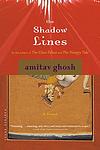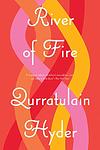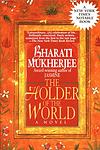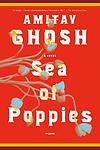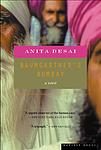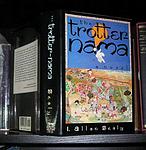The Greatest Indian "Historical fiction" Books of All Time
Click to learn how this list is calculated.
This list represents a comprehensive and trusted collection of the greatest books. Developed through a specialized algorithm, it brings together 300 'best of' book lists to form a definitive guide to the world's most acclaimed books. For those interested in how these books are chosen, additional details can be found on the rankings page.
Genres
Historical fiction is a genre of literature that combines fictional stories with real historical events, settings, and characters. These books often take place in a specific time period and are based on research and factual information, but also include imaginative elements to create a compelling narrative. Historical fiction allows readers to experience the past in a unique and engaging way, while also providing insight into the social, cultural, and political issues of the time.
Countries
Date Range
Reading Statistics
Click the button below to see how many of these books you've read!
Download
If you're interested in downloading this list as a CSV file for use in a spreadsheet application, you can easily do so by clicking the button below. Please note that to ensure a manageable file size and faster download, the CSV will include details for only the first 500 books.
Download-
1. Midnight's Children by Salman Rushdie
The novel tells the story of Saleem Sinai, who was born at the exact moment when India gained its independence. As a result, he shares a mystical connection with other children born at the same time, all of whom possess unique, magical abilities. As Saleem grows up, his life mirrors the political and cultural changes happening in his country, from the partition of India and Pakistan, to the Bangladesh War of Independence. The story is a blend of historical fiction and magical realism, exploring themes of identity, fate, and the power of storytelling.
-
2. A Suitable Boy by Vikram Seth
Set in 1950s India, this epic novel follows the story of four families over a period of 18 months, focusing primarily on the young woman Lata and her mother's quest to find her a suitable husband. The narrative explores the political, social, and personal upheavals in a newly independent India, struggling with its own identity amidst the backdrop of a society grappling with religious tensions, land reforms, and the shaping of a modern democratic state. Lata's journey is an exploration of love, ambition, and the weight of familial duty.
-
3. A Fine Balance by Rohinton Mistry
"A Fine Balance" is a poignant narrative set in India during the 1970s, a time of political turmoil and upheaval. The plot revolves around four diverse characters - a widow, a young student, and two tailors - who are brought together by fate. Through their interconnected lives, the book explores themes of caste, poverty, political corruption, and the human spirit's resilience. It offers a profound exploration of the delicate balance that sustains life amidst adversity.
-
4. Nectar in a Sieve by Kamala Markandaya
"Nectar in a Sieve" is a tale of an Indian peasant woman named Rukmani who endures the hardships of rural poverty, natural disasters, and personal tragedy, while trying to raise her children and maintain her marriage. The book explores themes of love, hope, and the strength of the human spirit against the backdrop of a rapidly changing India. Despite the constant struggles, Rukmani never loses her faith and hope, symbolizing the resilience and strength of ordinary people in the face of adversity.
-
5. Home and the World by Rabindranath Tagore
This novel is a political and philosophical exploration set in early 20th century India during the country's struggle for independence. It revolves around three main characters: a nobleman, his wife, and his friend, a fervent nationalist. The story unfolds as the wife, initially confined to the inner quarters of their home, begins to question her societal boundaries and the idea of nationalism after meeting her husband's friend. The narrative delves into the complexities of love, freedom, and the concept of home and world, set against the backdrop of the Swadeshi movement, a part of the Indian independence movement against British rule.
-
6. Heat and Dust by Ruth Prawer Jhabvala
"Heat and Dust" is a novel set in two different time periods in India, exploring themes of colonialism, gender roles, and cultural clash. The story alternates between the 1920s, following the scandalous life of Olivia, an English colonial wife who falls in love with an Indian prince, and the 1970s, where her step-granddaughter journeys to India to uncover the truth about Olivia's life and her own identity. The narrative exposes the complexities of love, culture, and identity in the context of British colonial rule and post-colonial India.
-
7. Untouchable by Mulk Raj Anand
"Untouchable" is a novel that explores a day in the life of a young Indian man, Bakha, who belongs to the lowest caste, the Untouchables. The narrative follows Bakha's experiences of extreme discrimination and humiliation as he performs his job as a latrine cleaner. Despite the harsh realities of his life, Bakha dreams of a better future and is fascinated by the modern world and British rule. The novel provides a poignant critique of the caste system and the social inequalities in India.
-
8. The River Sutra by Gita Mehta
"The River Sutra" by Gita Mehta is a captivating novel that explores the intertwining lives of various characters along the sacred river Narmada in India. Through vivid storytelling and rich descriptions, the book delves into themes of spirituality, love, and the search for meaning in life. As the characters embark on journeys of self-discovery, the river serves as a powerful metaphor for the flow of life and the interconnectedness of all beings. With its lyrical prose and thought-provoking narrative, "The River Sutra" offers a profound exploration of the human experience and the timeless wisdom of ancient traditions.
-
9. The Great Indian Novel by Shashi Tharoor
This book is a satirical take on Indian politics and history, cleverly intertwined with characters and events from the epic Mahabharata. The narrative presents a parallel between the two, with the characters in the novel mirroring significant figures from India's political scene during the Independence and post-Independence era. The book is a humorous yet thought-provoking critique of Indian society and politics, offering a unique blend of myth, history, and satire.
-
10. The Shadow Lines by Amitav Ghosh
"The Shadow Lines" is a novel that explores themes of memory, family, and national identity through the eyes of a young boy and his experiences growing up in Calcutta, India. The narrative is framed by two major historical events: the 1964 Dhaka Riots and the 1942 World War II. The protagonist's relationships with his family and his personal experiences are juxtaposed with these events, highlighting the complexities of identity, memory, and the lasting impacts of historical events on individual lives. The novel also delves into the arbitrary nature of national borders and the shadow lines they draw between people and their histories.
-
11. River of Fire by Qurratulain Hyder
"River of Fire" is an expansive novel that spans over 2,500 years of Indian history. The narrative unfolds through the intertwined lives of four characters who are reincarnated in different eras: a Buddhist monk in 400 B.C., a court poet in the Mughal Empire, a British colonial administrator, and a modern Indian intellectual. This literary masterpiece is a reflection on the cyclical nature of history, the continuity of life and the human spirit, and the eternal quest for freedom and identity, providing a panoramic view of the socio-political evolution of the Indian subcontinent.
-
12. Holder of the World: A Novel by Bharati Mukherjee
The novel explores the life of Hannah Easton, a woman born in 17th century Salem, who gets married to a British adventurer and travels to India. In India, she becomes the concubine of a local ruler and takes on the name "The Holder of the World". The story is narrated by a 20th-century woman who discovers Hannah's story through a virtual reality device. The narrative weaves together the historical and the contemporary, the East and the West, and the real and the virtual, to create a rich tapestry of a woman's life and the cultural clashes she experiences.
-
13. Rich Like Us by Nayantara Sahgal
Set against the backdrop of the Emergency in 1970s India, the novel weaves together the lives of two women from different social strata: an affluent London-born woman who marries an Indian businessman and a senior bureaucrat's daughter who becomes a political activist. As the political climate in India grows increasingly oppressive, their stories intersect, exploring themes of power, corruption, and the struggle for democracy. Through their personal and political journeys, the narrative delves into the complexities of wealth, class, and the impact of colonialism, while critiquing the authoritarian regime that threatens the moral fabric of Indian society.
-
14. Tamas by Bhisham Sahni
The book is a poignant narrative set against the backdrop of the communal riots during the partition of India in 1947. It delves into the lives of individuals and communities engulfed in the turmoil of the time. The story vividly portrays the descent into chaos and violence in a small town, as the once-peaceful coexistence between Hindus and Muslims is shattered by fear, suspicion, and hatred. Through its characters, the novel explores the human dimensions of a cataclysmic historical event, examining the complex interplay of social, political, and personal forces that lead to a devastating spiral of destruction and moral collapse.
-
15. Nampally Road by Meena Alexander
"Nampally Road" is a poignant narrative set against the backdrop of political turbulence in India. The story follows Mira Kannadical, a young woman who returns to Hyderabad after studying in England, only to find herself amidst a society rife with corruption, poverty, and political unrest. As she takes up a teaching position and begins to build a life, Mira's journey is interwoven with her personal quest for identity and her engagement with the struggles of the people around her. The novel explores themes of self-discovery, social injustice, and the complexities of postcolonial India, all while painting a vivid portrait of the city of Hyderabad and the titular Nampally Road, which becomes a symbol of the country's chaotic and vibrant life.
-
16. Train To Pakistan by Khushwant Singh
Set against the backdrop of the Partition of India in 1947, the novel delves into the tumultuous events that unfold in the border village of Mano Majra, where Sikhs and Muslims have coexisted peacefully for generations. As the country is cleaved into India and Pakistan, the once tranquil village is thrown into chaos by the arrival of a train filled with the corpses of Sikhs and Hindus, escalating communal tensions. The narrative follows the lives of several characters, including a young Sikh boy and a Muslim girl whose love story is threatened by the rising violence, and a local gang leader who faces a moral dilemma. Through these personal stories, the book explores the themes of human morality, the senseless brutality of mass violence, and the complex nature of religious and national identity during a time of crisis.
-
17. Sea of Poppies by Amitav Ghosh
"Sea of Poppies" is a historical novel set in the 1830s, just before the Opium Wars. It traces the intertwined lives of a diverse group of characters, from a raja turned convict, a widowed poppy grower, a French orphan, to a mulatto American freedman, all of whom are brought together on the Ibis, a former slave ship now used for transporting opium. The story explores the social and economic impact of the opium trade, colonialism, and the caste system, while also delving into the personal histories, relationships, and struggles of the characters.
-
18. The Fig Tree by Aubrey Menen
"The Fig Tree" by Aubrey Menen is a thought-provoking novel that delves into the complexities of identity and self-discovery. Set in India during the country's struggle for independence, the story follows the journey of a young man named Raman, who embarks on a quest to find his true purpose in life. Through vivid descriptions and rich character development, the novel explores themes of cultural clash, spiritual enlightenment, and the search for personal fulfillment. With its lyrical prose and insightful reflections, "The Fig Tree" offers a captivating exploration of the human condition and the universal quest for meaning.
-
19. Coolie by Mulk Raj Anand
"Coolie" is a poignant and powerful novel that delves into the life of Munoo, a young boy from a small village in India who is forced into a life of labor as a coolie. Set during the British colonial era, the story explores themes of exploitation, poverty, and the harsh realities faced by the lower classes. Munoo's journey takes him from his village to bustling cities, encountering both cruelty and kindness along the way, ultimately shedding light on the injustices of the time.
-
20. Out Of India by Ruth Prawer Jhabvala
"Out of India" is a collection of stories and essays that provide a rich and evocative portrayal of Indian society and the complexities of its cultural and social tapestry. The author, born in Germany and having spent a significant part of her life in India, uses her unique perspective to explore themes of identity, displacement, and the nuances of East-West encounters. Through vivid characterizations and keen observations, the book captures the essence of India, from its bustling cities to its rural landscapes, offering insights into both the beauty and the contradictions of the country. The work is a reflection on the author's experiences and observations during her time in India, making it both a personal and deeply insightful read.
-
21. Kanthapura by Raja Rao
"Kanthapura" is a powerful novel that tells the story of a small South Indian village as it becomes embroiled in the struggle for independence from British rule. Through the eyes of a young woman named Moorthy, the reader witnesses the transformation of the village and its people as they are inspired by the teachings of Mahatma Gandhi and join the fight for freedom. The novel explores themes of unity, sacrifice, and the power of nonviolent resistance, offering a poignant portrayal of the impact of colonialism on rural communities and the strength of the human spirit.
-
22. Baumgartner’s Bombay by Anita Desai
In "Baumgartner's Bombay" by Anita Desai, the story revolves around Hugo Baumgartner, a German Jew who fled to India during World War II. Set in Bombay, the novel explores the themes of identity, displacement, and the search for belonging. As the narrative unfolds, Hugo's life becomes entwined with that of the city's street children, leading to a poignant and thought-provoking exploration of love, loss, and the complexities of human connections.
-
23. The Trotternama by I Allan Sealy
"The Trotternama" is a mesmerizing tale that weaves together the lives of various characters in a small Indian village. Set against the backdrop of political and social changes in post-independence India, the story explores themes of identity, love, and the search for meaning. With lyrical prose and rich descriptions, the author takes readers on a journey through the intricacies of human relationships and the complexities of a rapidly changing society.
-
24. Raavan & Eddie by Kiran Nagarkar
"Raavan & Eddie" is a captivating coming-of-age story set in the bustling streets of Mumbai. The book follows the lives of two young boys, Raavan and Eddie, who grow up in the same chawl and share a unique bond. As they navigate the challenges of poverty, family dynamics, and societal expectations, their friendship is tested, and their dreams take them on unexpected paths. With humor, heart, and a vivid depiction of Mumbai's vibrant culture, this novel explores themes of identity, love, and the pursuit of dreams in a rapidly changing world.
-
25. When Dreams Travel by Githa Hariharan
"When Dreams Travel" is a thought-provoking novel that explores the complex themes of identity, memory, and the power of dreams. Set in India, the story follows the lives of three individuals from different backgrounds who are brought together by a shared dream. As they embark on a journey to uncover the truth behind their dreams, they are confronted with their own pasts and the interconnectedness of their lives. Hariharan's lyrical prose and vivid descriptions create a captivating narrative that delves into the depths of the human psyche and the universal longing for self-discovery.
Reading Statistics
Click the button below to see how many of these books you've read!
Download
If you're interested in downloading this list as a CSV file for use in a spreadsheet application, you can easily do so by clicking the button below. Please note that to ensure a manageable file size and faster download, the CSV will include details for only the first 500 books.
Download








